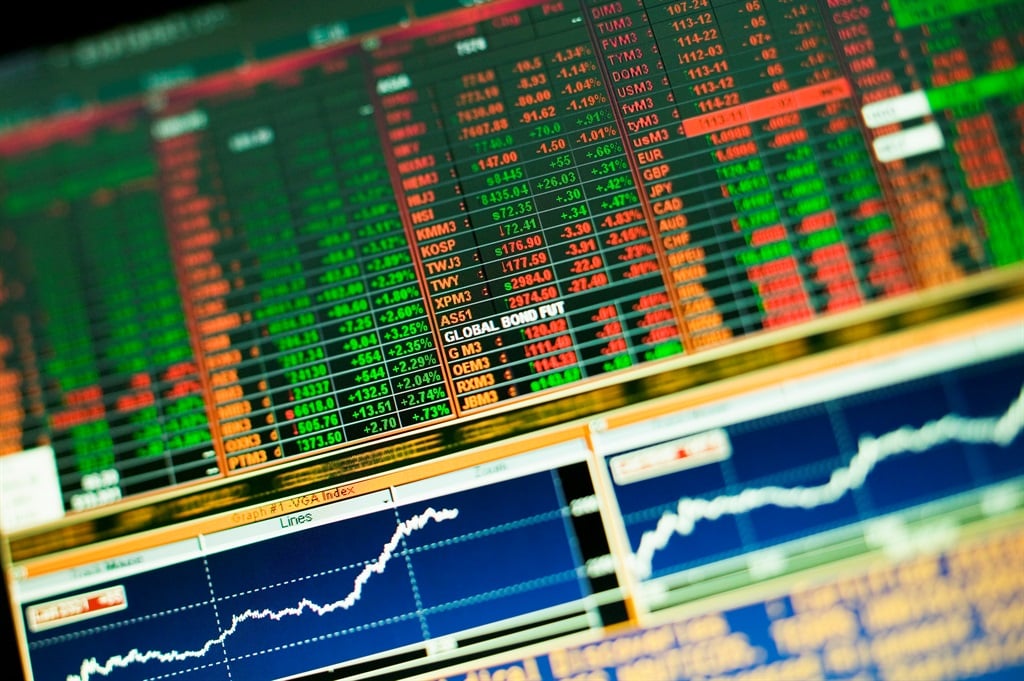Global shares steadied on Monday, after President Joe Biden’s decision to bow out of the election race at the weekend injected a degree of optimism into the markets, while a surprise rate cut by China’s central bank failed to give Asian markets any pep.
Biden announced on Sunday he would drop out of the election race and endorsed Vice President Kamala Harris for the Democratic ticket.
Online betting site PredictIT showed pricing for a victory by Donald Trump had fallen 4 cents to 60 cents, while Harris climbed 12 cents to 39 cents.
Markets took the news in their stride, with S&P 500 stock futures nudging up 0.1%, while Nasdaq futures added 0.2%.
The MSCI All-World index, which fell 2.1% last week in its worst weekly performance since April, was narrowly in positive territory. The JSE’s All Share Index gained 0.7%, with Sasol (+6%) and Amplats (3%) gaining ground after announcing a trading update and results, respectively..
The dollar held steady against a basket of currencies , while crypto – which has tended to be a beneficiary of the growing chances of a return of Trump to the White House – steadied after having fallen on Sunday following Biden’s announcement.
“There’s been a bit of a unwinding of that ‘Trump trade’, those fears we saw last week that lifted the dollar and pressurised European stocks at least and an overall, a bit of an upbeat mood on the news,” Fiona Cincotta, senior market analyst at City Index, said.
“What has been interesting has been crypto. It’s like the Trump barometer and that is off slightly. So that does suggest that, potentially, there is a little bit more of a challenge presented from Kamala Harris,” she said.
Bitcoin, which hit six-week highs last week in its strongest weekly rally since February, traded on a more even keel on Monday, up 0.5% at $67,230.
The rand was trading at R18.26 to the dollar.
US Treasuries strengthened, pushing yields on the benchmark 10-year note down 2.2 basis points to 4.217%. Yields rose sharply last week as investors priced in the prospect that a Trump administration would likely favour big increases in spending that would further undermine the United States’ already stretched fiscal position.
Earnings dominate
A packed week of corporate earnings will see Tesla and Google-parent Alphabet kick off the season for the “Magnificent Seven” megacap group of stocks.
The tech sector is projected to increase year-over-year earnings by 17%, while profit for the communication services sector is seen rising about 22%.
Such gains would outpace the 11% estimated rise for the S&P 500 overall, according to LSEG IBES.
“The majority of the Magnificent Seven release their earnings results over the next couple of weeks and this will be critical in determining whether, near term at least, this rotation has further to run,” Rupert Thompson, chief economist at IBOSS, part of Kingswood Group, said.
“The US earnings season is of course far from unimportant for the market overall and is well underway.”
Europe’s biggest banks also report this week, with eyes on whether the gains from higher interest rates have run out of steam and if recent political drama is weighing on sentiment.
The STOXX 600 was up almost 1%, snapping back after a 2.6% drop last week.
In Asia, MSCI’s broadest index of Asia-Pacific shares outside Japan lost another 0.7%, having shed 3% last week.
The People’s Bank of China cut short-term rates by 10 basis points, which pulled down long-term borrowing costs and bond yields. The move follows Beijing’s release of a policy document on Sunday outlining its ambitions for the economy.
Investors seemed underwhelmed with the move, in part as it only emphasised how weak the economy was, and Chinese blue chips slipped 0.9% along with the yuan.
The macro calendar is fairly packed this week too, with the Federal Reserve’s favoured inflation measure out on Friday and a reading for advance U.S. gross domestic product.
Markets are fully pricing in the prospect of a rate cut in September, which has helped underpin risk appetite.
In commodity markets, gold rose 0.1% to $2,402 an ounce , shy of last week’s record high of $2,483.60.
Oil prices rose, with scant sign of progress on a ceasefire deal in Gaza as Israeli forces battled Palestinian fighters in the southern city of Rafah on Sunday.
Brent rose 0.4% to $82.91 a barrel, while U.S. crude rose 0.3% to $80.40.





















Discussion about this post